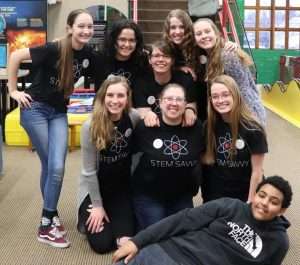Launch Your Teen Science Café Leadership Group With the Right Tools and Skills.
Are you an adult leader or mentor for a Teen Science Café program? This article has a number of great ideas on leadership, and how to support teens’ growth as leaders. It is focused on the 4-H model, but aligns perfectly with the Teen Science Café Network’s (TSCN) program model, the thoughts expressed here can benefit all adults working with teens to put on a café.
This is an edited excerpt*, shared with permission** of Teen Leaders: A Leader’s Manual, from the 4-H Council at the University of Vermont Extension service, itself adapted from Montana State University, Teen Leadership Leader’s Manual, July 1996.
A growing number of 4-H clubs have embraced the Teen Science Café model as a new and popular program offering; the Core Design Principles of a Teen Science Café, with the TSCN’s emphasis on teens taking the lead, doing something for one’s community/peers, community involvement, active learning, and adult mentorship, aligns well with 4-H’s positive youth development. *
Leadership is the giving of yourself in helping others reach a common goal. It is not a mystical trait that one individual has and another does not have. It is learned behavior that you can improve by study and application. Leaders are not born; they are developed, almost completely by their own effort. That’s what this Teen Leadership project is all about: developing your leadership potential!
To live happy and contributing lives in our society, people need to be able to help themselves (and often others) to achieve their goals. The skills needed to take responsibility for personal action and to work with other people in achieving goals are embodied in what we call leadership skills.
Involving…youth in leadership skill development can benefit them in the following ways:
Increased self awareness
Better personal decision-making
Increased sense of control over their lives
Enhanced self-esteem
More capable members and leaders of the youth groups they are part of
Enter adulthood with a head start
Young people can develop high levels of leadership skills if they are first given the opportunity to experience and practice basic skills with guidance from [adult mentors].
Developing Successful Teen Leader Programs
Research conducted by The Ohio State University has identified five principles of successful Teen Leadership Development. As you work with the teen leadership project, we suggest you incorporate these five principles:
Embody high expectations of, confidence in, and respect for participants.
Emphasize experiential learning and provide opportunities for teens to exercise genuine leadership.
involve teens in collaborative experiences, working cooperatively with their peers
help youth develop skills related to leadership (life skills and specific leadership skills)
Involve teens in service to others, to their community, country and world.
Involve youth in significant relationships with mentors, positive role models, or other nurturing adults.
Be developed around stated purposes and goals.
Beliefs About Leadership
Everyone needs leadership skills. Leadership skills are required for ourselves, as well as to lead other people. Leadership knowledge is needed in order to be an effective member of a group as well as to direct the activity of a group. No one is a formal leader at all times.
Leadership can be learned through experience and practice, just like other skills. It is not only behaviors or qualities leaders have to know, but also what to do with what they know, that will determine success.
Leadership is a relationship between people. It is the way that leaders interact with others and their sensitivity to what others need. The skills a leader has are only important when they are used well with people. We can learn leadership skills best by practicing leadership behaviors with other people.
Appropriate leadership is determined by the situation. Different people lead at different times. The combination of the leader, the group, and the goals of the group determine the appropriate type of leadership. The group members must work with the leader to achieve the desired results.
Youth Learning Characteristics
As an adult leader working with youth of different ages, you need to know something about the different ages and stages of youth development. Knowing some general characteristics about different age groups will help you be more effective in your work with them.
What is Leadership?
Leadership is a personal and unique trait. Often, it means giving of oneself in helping others. A good leader analyzes him or herself to determine in what way he or she can help others.
How does one develop leadership skills? They are learned by observing and listening to others, and by experimenting and practicing leadership behaviors. Leadership behaviors are the actions used by leaders. Learning experiences can be designed to provide us with opportunities to observe and practice leadership behaviors. At first, we concentrate on performing these actions in specific situations. Later, as we become comfortable with these behaviors, they will become natural to us and part of the leadership skills we use throughout our lives.
It is very difficult for anyone to develop leadership skills unless he or she has a chance to try the behaviors needed for leadership first.
…The best leader can also be the one who is seldom seen. He or she is always around, always helpful and cooperative, often encouraging or praising. Effective leaders are rarely out in front, putting on a show themselves. The leader has learned that the best way to get things done is to have everyone help in choosing, planning, and doing. The less the leader personally had to organize and direct the activities, the better the job she or he is doing as a leader.
The strongest clubs and groups are those where leadership jobs are divided among all members. Each person takes a responsibility he or she can do best. They all have to help each other because no one of them is leading the group alone. It takes time, patience and cooperation to develop shared leadership.
Types and Styles of Leadership
What style of leadership is best? What type of leadership works better with young people? The truth is that there is not one style or approach that works with all people or in all situations. You need to find the style that is right for you and the group with whom you’re working.
Leadership is a skill that can be learned. Effective leaders are not born, but made by their own efforts. People can become more effective leaders by examining their own views on leadership, how they respond to the help of others, and watching how successful leaders work with people and interact in groups. Good leaders share leadership, recognition, satisfaction, and the feeling of power that accompanies teamwork.
No one approach is right for all leaders. Likewise, there is no one style of leadership that will work in all situations. The most effective leadership techniques combine aspects of several approaches to leadership.
Rather than embracing any one particular approach or theory of leadership, you will want to find the leadership style that works best for the age and maturity of those youth with whom you work. Everyone’s style of leadership is unique and is influenced by many factors. If you keep the goal of youth development in mind, you’ll choose an approach which is right for each group of young people.
Your Role in Youth Group
There are many benefits from working with teen leadership project members as a group. Members can work with and help one another learn as peers. Research with youth shows they prefer to learn in this kind of informal, non-competitive setting. In such settings, they can share ideas, encourage and motivate each other. They can also learn social responsibility. Group work makes learning more fun and more relevant for youth.
As an adult leader, your role is to help young people develop a sense of autonomy and personal responsibility. Why is autonomy so important? A sense of autonomy enables youth to make decisions for themselves. Autonomous young people are not subject to the whims and fancies of others but are self-directing. But autonomy is not synonymous with complete freedom to do as one pleases. Empowered, autonomous youth take into account relevant factors in deciding the best course of action for all concerned. Young people develop a sense of moral responsibility and personal accountability by being engaged in real life situations, by exchanging viewpoints with others, and by respecting the opinions of others even when they are wrong.
Thus, your role as a leader in this project is critical. You can help your members develop individual plans of action. Once common goals are identified, group learning activities can be planned. Adult leaders then have opportunities to provide guidance and encouragement. As goals are completed, a leader can assist with evaluation.
Letting Go
As an adult leader for this project, your role is to help youth develop to their fullest potential. As a leader, you need to “let go,” to stand back and watch teens practice leadership skills without interference. …At times, you must allow teens to strike out on their own and develop their leadership skills and views on leadership. Once they have learned some of the skills, they must be allowed their freedom and not be constantly told what to do. This is the point at which the adult needs to develop a coaching attitude and offer encouragement, praise, and constructive criticism. As one person put it, your goal is-
To be the guide on the side, not the sage on the stage. Adult leaders must give encouragement and offer suggestions at certain times but “let go” of their personal need for recognition and glory and allow teen leaders to earn the respect and recognition of others.
Your Role As a Leader
The [Teen Science Café program model] has been designed to provide an environment where youth are encouraged to practice leadership skills. Before teens can practice leadership skills, however, the leader must make certain that the environment is safe. One way that leaders can be assured is to analyze their own attitudes towards working with young people.
Research in Montana on adult leadership styles has revealed some clear messages about desirable approaches for working with youth. This research has shown that leaders create effective learning environments when they encourage young people to develop a sense of personal responsibility and to help youth assume more roles even when mistakes are made.
Youth who participate in these kinds of groups demonstrate higher levels of satisfaction than youth in other kinds of groups. In addition, youth in these kinds of empowering environments learn more life skills and develop more practical skills than youth in other environments.
In contrast, more control-oriented leaders tend to experience more rebellion, more acting out, more non-attending behaviors, and youth are more dissatisfied with their …experience than youth in autonomy-oriented groups. Youth in control-oriented clubs tend to learn fewer life skills and think of [them] as less fun than other groups. Ironically, the more a control-oriented leader tries to exert control over youth, the more young people rebel and the more chaos is likely to result.
Your role as a leader for this project is to provide the mature guidance necessary for youth to feel a sense of ownership and influence yet to experience risk-taking in a safe environment. Some have referred to this approach as “firm yet flexible.” Research suggests that teens are looking for activities and programs which permit them to interact with others with a moderate level of supervision but not a formal format, a program where they can control most of this action.


